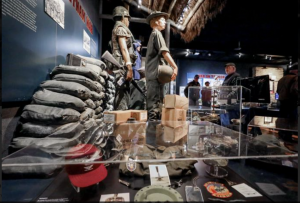The Vietnam war was one of the most devastating tragedies that occured in the global south, that started years before fighting even began. As explained to me in my Arts Seminar class at the University of British Columbia, this tragedy began with North Vietnam and South Vietnam fighting in cold war about who would eventually rule all of Vietnam, however, through their own country’s turmoil, the United States found their way into this conflict, and ended up contributing to the death of 1.5 million Vietnamese civilians. According to scholar Seth Offenbach in his book “The Conservative Movement and the Vietnam War”, the war was centered around South Vietnam’s fight against the overthrowing communist government of North Vietnam, but unfortunately after the victory of North Vietnam, hundreds of thousands of South Vietnamese people were forced to flee overseas, and unfortunately a third of these people ended up losing their lives. Despite this war and tragedy being an internal conflict of Vietnam, the United States ended up taking this war and built their own narrative that once again highlights the American lives in the tragedy. Memorials and museums have been set up all over the US celebrating the American lives lost in the Vietnam war, and how their contribution was essential to resolve the conflict in Vietnam.
The problem that has occured for centuries, and can be perfectly applied to this scenario is how the narrative of the Western world is constantly applied to events that occur all over the globe, and overshadows the true components of what happened. The physical monuments and buildings created specifically for these Western narratives surrounding global events are highlighted as an example in the Wisconsin State Journal. They wrote an article about how a Wisconsin museum was transformed to recognize the young American veterans that served in the Vietnam war, but shockingly showed no focus on the veterans, or innocent civilians of Vietnam. This is something that is often overlooked in the memorial and museum system, because the overpowering image and narrative that people get when they visit them, or even think of the term memorial or museum is something positive. This connotation and connection comes from a place of good feelings and remembrance, and many people feel like they are honouring the tragedy that happened, and paying their respects to lives lost in these monuments. However there is little questioning that happens in terms of what they are honouring, and is it even the true event, or someone’s version of it?
Something that I’ve been taught over the past year is that it is crucial to question what is right in front of you, even if it may seem the most mainstream and obvious to the rest of the world, there is always the possibility that there is a totally different perspective that doesn’t have the light shining on it. Not every narrative includes all perspectives, especially the original perspective. In terms of the Vietnam war, and the American museums and memorials, those are artifacts, pivotal permanent reminders of how the real true perspective will never be accepted by the world. The curated narrative by the Western world will always overpower what has truly happened due to the forceful stance they take through the images, statues, artistry, and buildings they have put in place. What’s important is that we think twice about what we see in front of us. When presented with a museum or memorial, we should be asking ourselves many questions before believing the narrative that we are first confronted with. With the Vietnam war in American museums, we must think to ourselves, what role did American soldiers play in the war? What is the history behind the war and how did the American military find themselves involved in the war? We must also think about not just the American lives that were lost, but what about the Vietnamese lives? How were the generations of civilians impacted, how many were killed, how many had to flee the country? What is interesting is that now, the American museums and memorials are receiving funding, and attention from people all over the world, and the veterans killed receive such honour, but what about the Vietnamese veterans and civilians? We must think what is happening in their lives? Do they get museums and monuments and funding put in their name? It appears to most of the Western world that they get washed away, forgotten about, and never recognized, which in every single situation should never be the case. The original, and true narrative of every event, including the Vietnam war, should always be front and centre of the public eye.

Image from Wisconsin State Journal Article of Wisconsin Vietnam War Museum